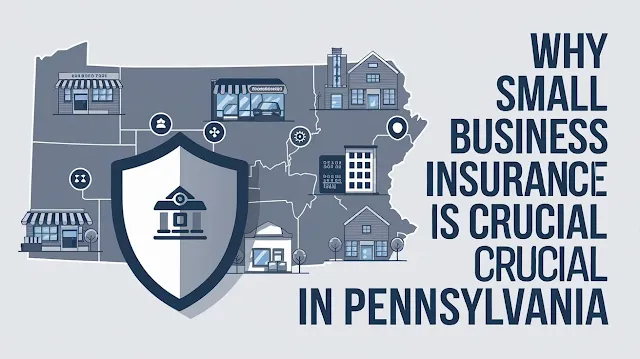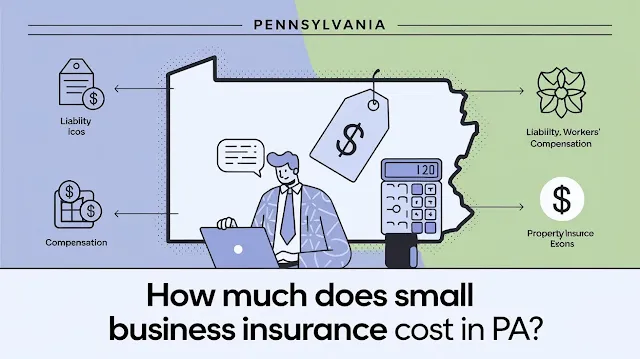Introduction
Small business insurance is a crucial consideration for any entrepreneur in Pennsylvania (PA). It provides financial protection against a variety of risks, including liability, property damage, and even employee-related claims.
Whether you're just starting out or scaling your business, having the right insurance policy in place is key to safeguarding your hard work.
In this A-to-Z guide, we will break down all the essentials of small business insurance in PA for 2024, covering types of insurance, costs, regulations, and how to choose the right plan.
This guide is specifically designed to help Pennsylvania small business owners navigate the complex world of business insurance, offering practical advice, expert insights, and tips for saving money.
What is Small Business Insurance?
Small business insurance is a group of policies designed to protect your business from various financial risks. These risks can include liability claims, property damage, employee injuries, cyberattacks, and more.
Insurance allows small business owners to operate with peace of mind, knowing that their assets and employees are protected against unforeseen events.
Why Small Business Insurance is Crucial in Pennsylvania
The business landscape in Pennsylvania is highly diverse, ranging from rural farms to high-tech startups in cities like Philadelphia and Pittsburgh.
As of 2023, there are over 1 million small businesses in the state, employing nearly 2.5 million people. With this thriving environment, the need for robust insurance coverage is paramount.
Key Reasons to Have Insurance:
- Legal Compliance: Certain types of insurance, like workers’ compensation, are required by law in Pennsylvania.
- Financial Security: Without insurance, an accident, lawsuit, or natural disaster could lead to financial ruin.
- Reputation Protection: Insurance can help cover legal fees and settlements, preventing damage to your business reputation.
- Employee Protection: Coverage such as health and workers’ compensation insurance can help attract and retain quality employees.
Types of Small Business Insurance in PA
There are several types of insurance coverage available to small business owners in Pennsylvania, each designed to address specific risks.
1. General Liability Insurance
General liability insurance is essential for almost all businesses. It covers claims related to bodily injury, property damage, and advertising injury.
For example, if a customer slips and falls in your store, general liability insurance would help cover the legal fees and medical expenses.
Example: A coffee shop in Pittsburgh may need general liability insurance to cover potential slip-and-fall accidents or damage to a customer's property.
2. Professional Liability Insurance
Also known as errors and omissions (E&O) insurance, professional liability insurance is important for service-based businesses. It protects against claims of negligence or inadequate work.
This is especially critical for professions like consulting, real estate, or accounting, where mistakes can lead to significant financial losses for clients.
Comparison: While general liability covers physical damages, professional liability focuses on mistakes or omissions in services provided.
3. Workers' Compensation Insurance
In Pennsylvania, businesses with one or more employees are required to have workers' compensation insurance.
This policy covers medical expenses and lost wages for employees who get injured on the job. It also protects the business from lawsuits related to workplace injuries.
Stat: According to the Pennsylvania Department of Labor & Industry, over 165,000 workers' compensation claims are filed each year.
4. Commercial Property Insurance
Commercial property insurance protects your business's physical assets, such as buildings, inventory, and equipment, from perils like fire, theft, or vandalism.
This coverage is crucial for businesses that own or lease property.
Example: A small restaurant in Philadelphia might rely on commercial property insurance to replace equipment damaged in a fire.
5. Business Owner’s Policy (BOP)
A Business Owner's Policy bundles general liability and commercial property insurance, often at a lower premium than purchasing the policies separately.
BOPs are ideal for small to mid-sized businesses looking for comprehensive coverage in a single package.
Fact: Many insurers offer customizable BOPs, allowing businesses to add coverages like business interruption insurance.
6. Cyber Liability Insurance
As cyberattacks become more frequent, businesses that handle sensitive data should consider cyber liability insurance.
This policy helps cover the costs associated with data breaches, including legal fees, notification expenses, and credit monitoring for affected customers.
Stat: Pennsylvania saw over 7,000 reported data breaches in 2022 alone, making cyber insurance a growing necessity.
How Much Does Small Business Insurance Cost in PA?
The cost of small business insurance in Pennsylvania can vary significantly depending on several factors, including the type of coverage, industry, location, and number of employees.
Average Costs:
- General Liability Insurance: Around $500-$1,500 per year for small businesses.
- Professional Liability Insurance: Typically costs between $600-$2,000 annually, depending on the profession.
- Workers' Compensation Insurance: Rates are based on payroll and industry risk, but expect to pay around $0.95-$2.75 per $100 of payroll.
- Cyber Liability Insurance: Costs can range from $1,000 to $3,500 annually depending on the level of risk and the amount of sensitive data handled.
Fact: Small businesses in low-risk industries, such as consulting or IT services, generally pay less for insurance than higher-risk businesses like construction or manufacturing.
How to Choose the Right Small Business Insurance in Pennsylvania
Selecting the right insurance policy requires a careful evaluation of your business's risks and needs. Here are some tips to help you choose the best coverage:
1. Assess Your Risks:
Identify the specific risks your business faces. For example, a restaurant may need higher liability coverage than a home-based consultancy.
2. Compare Quotes:
Always get quotes from multiple insurance providers to ensure you're getting the best rate.
3. Understand Policy Limits:
Pay attention to coverage limits and exclusions to avoid gaps in protection.
4. Consult an Expert:
Work with an insurance broker or agent who understands Pennsylvania's regulatory requirements and can recommend policies tailored to your business.
Legal Requirements for Small Business Insurance in PA
Pennsylvania has specific insurance requirements for businesses. Some of the most common legal requirements include:
- Workers' Compensation: Any business with one or more employees must carry workers' compensation insurance, as required by the Pennsylvania Workers' Compensation Act.
- Commercial Auto Insurance: If your business owns vehicles, you are required by law to have commercial auto insurance with minimum liability coverage.
- Professional Liability Insurance: While not mandated by law, certain professions, like real estate agents and doctors, may be required to carry professional liability insurance as part of their licensing requirements.
External Link: For more detailed information on Pennsylvania's workers' compensation requirements, visit the official Pennsylvania Department of Labor & Industry website.
Best Small Business Insurance Providers in Pennsylvania
Here are some of the top-rated small business insurance providers serving Pennsylvania:
- The Hartford: Known for offering comprehensive business owner’s policies (BOP) and specialized coverages.
- Nationwide: Offers customizable plans for general liability, commercial property, and workers’ compensation.
- Chubb: Known for its superior cyber liability coverage, ideal for tech companies and businesses handling sensitive data.
- State Farm: A reliable choice for small businesses looking for personalized coverage with strong customer service.
To explore and compare insurance providers, visit Insureon, a leading online small business insurance marketplace.
Common Small Business Risks in Pennsylvania
Running a small business in Pennsylvania comes with its own set of risks, which can vary by industry and location.
- Natural Disasters: Pennsylvania experiences frequent flooding, especially in low-lying areas. Businesses near rivers or coastlines should consider flood insurance.
- Lawsuits: Legal risks, including employee disputes or customer injury claims, are a constant concern for small business owners.
- Cyber Threats: With the growing digital landscape, cyberattacks are becoming a more prevalent risk for businesses in Pennsylvania.
How to Save on Small Business Insurance
While insurance is an essential expense, there are several strategies to reduce costs:
- Bundle Policies: Combining general liability, commercial property, and other coverages into a BOP can lead to significant savings.
- Increase Your Deductible: Opting for a higher deductible can lower your premium, though you'll need to pay more out-of-pocket for claims.
- Implement Risk Management: Reducing your business’s risks, such as installing security systems or providing safety training, can lower your premiums.
- Pay Annually: Some insurers offer discounts for paying premiums upfront instead of monthly.
For more tips on saving money on business insurance, visit NerdWallet, which offers expert financial advice for small businesses.
Conclusion
In conclusion, securing the right small business insurance in Pennsylvania is not just a legal necessity—it’s a smart business decision.
By protecting your assets, employees, and reputation, you can focus on growing your business with peace of mind.
To find the best insurance policy tailored to your needs, get a free quote today from a trusted provider.
Ready to safeguard your business? Click here to get a customized small business insurance quote for your Pennsylvania business now!
Small Business Insurance FAQs
What is the best insurance for a small business? +
The best insurance for a small business depends on its specific needs. A Business Owner's Policy (BOP) is often ideal as it combines General Liability Insurance and Commercial Property Insurance into a single package. Additionally, depending on the business type, you may need Professional Liability Insurance, Workers' Compensation Insurance, and Cyber Liability Insurance for added protection.
How much is a 2 million dollar insurance policy for a business? +
The cost of a $2 million general liability insurance policy varies, but small businesses can expect to pay between $500 and $3,000 annually. The industry, business size, location, and risk profile affect the exact pricing.
What is the minimum liability insurance in PA? +
In Pennsylvania, businesses must carry at least $15,000 in bodily injury per person, $30,000 per accident, and $5,000 for property damage for commercial auto insurance. While there’s no minimum for general liability insurance, it's recommended to carry at least $1 million in coverage to protect against lawsuits.
What type of insurance is sold to small businesses? +
Small businesses typically purchase a variety of insurance types, including:
- General Liability Insurance: Covers bodily injury and property damage claims.
- Commercial Property Insurance: Protects business property from risks like fire or theft.
- Professional Liability Insurance: Covers service-related businesses for mistakes or negligence.
- Workers' Compensation Insurance: Provides medical and wage benefits to employees injured at work.
- Business Owner’s Policy (BOP): A bundled option that includes general liability and property insurance.
- Cyber Liability Insurance: Covers data breaches and cyberattacks.
What kinds of insurance must you purchase when you open your own business? +
When starting a business, the required insurance depends on your state and industry. Key types include:
- Workers' Compensation Insurance: Required in most states if you have employees.
- General Liability Insurance: Strongly recommended to protect against third-party claims.
- Commercial Auto Insurance: Required if your business owns vehicles.
- Professional Liability Insurance: Required in some professions, such as healthcare and real estate.
- Commercial Property Insurance: Essential if your business owns or leases physical property.
Check local regulations and industry-specific requirements to ensure you meet insurance mandates.










It's a must-read for entrepreneurs who want to make sure they’re properly insured and compliant with state laws. Highly recommended!
ReplyDeleteIt breaks down the different types of insurance needed, such as general liability, workers' compensation, and property insurance, while explaining the specific legal requirements in the state.
ReplyDelete